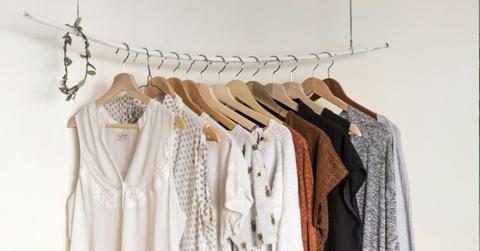 NEWS
NEWSFeel Good Fashion! The Surprising Way Your Clothes Could Be Empowering Women Around the World

April 16 2025, Published 1:05 a.m. ET
We all love a cheeky wardrobe update – especially when it’s on trend and on budget. But let’s be honest: fast fashion has been under fire in recent years, with stories exposing poor working conditions and environmental damage.
But there’s a twist you might not expect: Bangladesh, long at the centre of the fast fashion debate, is now leading a quiet revolution – and women are at the heart of it.
The country’s textiles industry is huge – we’re talking about a massive 4.2 million workers, 90% of whom are women. This industry accounts for over 84% of Bangladesh’s total exports, and after money sent home from overseas workers, it’s the country’s second-largest source of foreign currency.
This story goes much deeper than business. It’s an empowering tale about women changing their futures through fashion.
Behind every pair of high-street jeans or festival-ready crop top is a woman who’s gaining a lot more than a paycheck. These jobs give Bangladeshi women economic power, self-esteem, and the confidence to make their own decisions – whether it’s choosing when (or if!) to marry, how many kids to have, or how to spend their hard-earned money.
The shift is massive.
Many women working in Bangladesh’s textiles sector are gaining greater control over their lives. With a steady income, they’re able to save, contribute to household decisions, move more freely in public, and invest in their children’s health and education. These shifts –though still evolving – are helping lay the groundwork for the next generation to grow up with more stability and opportunity.
The impact doesn’t stop there. When women earn, entire communities benefit. Studies show they’re more likely to spend their income on essentials like nutrition, schooling, and medical care – boosting long-term outcomes for their families.
It’s the kind of girl power that would make even Beyoncé proud. (“We’re smart enough to make these millions, strong enough to bear the children, then get back to business,” anyone?)
There are numerous success stories. Nazma Akter, for example, started working in a garment factory at only 11 years old. She went on to found the Awaj Foundation and now represents over 70,000 workers through her union leadership, advocating for safer, fairer conditions across the industry. Her journey from child worker to national changemaker shows how transformative this sector can be for women who are determined to rise.
It gets better. These jobs give women greater financial freedom, helping them dream bigger. They’re gaining valuable skills, taking on leadership roles, and standing up for their rights through labour unions. With support from programmes like Better Work and Gender Equality and Returns (GEAR) – run by the International Labour Organization and the International Finance Corporation – more women are stepping into management roles and enjoying safer, fairer workplaces.
One of those women is Ruma Akhtar, who started out as a novice sewing machine operator. GEAR provided her with training and on-the-job experience that has more than doubled her salary and set her on the path to a supervisory role. She’s part of a growing number of women quietly reshaping the power dynamics inside factories, proving that leadership doesn’t have to look the way it always has.
Want OK! each day? Sign up here!
Even at the very top, women are making waves. Maheen Khan is a pioneer in integrating traditional Bangladeshi designs into modern fashion, who founded Mayasir, a renowned fashion house. She also played a pivotal role as the founding chair of the Fashion Design Council of Bangladesh, promoting the country's rich heritage in the global fashion arena.
Let’s not forget: the world now goes through around 80 billion new pieces of clothing every year – that’s four times more than just twenty years ago! That kind of demand puts pressure on producers, but Bangladesh is proving it can keep up while raising standards across the board.
The factories themselves are getting a glow-up. Many are ditching water-intensive dye processes, installing solar panels, and using recycled materials to reduce their environmental footprint. Bangladesh now boasts over 200 internationally acclaimed eco-factories – some of the greenest in the world.
So yes, your next outfit could be both sustainable and stylish.
Next time you check the label and see that a garment was manufactured in Bangladesh, don’t automatically put it back on the rail. Behind that tag could be a story of progress—of a woman gaining independence, supporting her family, or stepping into a leadership role. And in buying these clothes you’re buying into a global movement that’s stitching together progress, one seam at a time.
Now that’s feel-good fashion.
About Author:
Nathalie Beasnael, a multilingual nurse, entrepreneur, and humanitarian from Chad, is based in Los Angeles. With a rich international background across Ghana, Spain, England, and the U.S., she is a licensed Recovery Nurse at the Surgical Institute in Beverly Hills and co-founder of N and M Cosmetics. She also founded Health4peace, a nonprofit supporting rural hospitals in Africa, and serves as Director of International Affairs for Upward African Woman. Nathalie hosts the show Beasnael: We Are Not the Same and is a recurring guest on NPR’s KPFK. Her career spans healthcare, media, philanthropy, and the entertainment industry.

